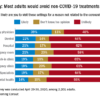News
COVID-19 pulmonary severity ascribed to coagulation differences
May 6, 2020
Higher mortality risk among whites with severe COVID-19 infections may be linked to higher propensity for thromboembolism than Chinese patients.
News
New angiotensin studies in COVID-19 give more reassurance
May 6, 2020
A deluge of new data does not suggest harm with ACE inhibitors and angiotensin blockers in COVID-19 rates or outcomes.
![1]()
News
Don’t delay antibiotic treatment in elderly patients with UTI
May 6, 2020
Is there an association between delayed antibiotic treatment and adverse outcomes in elderly patients with suspected or confirmed urinary tract infections (UTIs)?
News
Multisociety roadmap eyes restarting elective cardiac cases
May 6, 2020
A new consensus document provides guidance on the safe reintroduction of cardiovascular procedures and testing derailed by the COVID-19 pandemic.
News
FMT may improve outcomes without clearing multidrug-resistant organisms
May 5, 2020
For seriously ill patients with multidrug-resistant organisms in their gastrointestinal tract, performing a fecal microbiota transplant may result in fewer and less severe infections.
![1]()
News
Pandemic effect: All other health care visits can wait
May 5, 2020
Survey shows that most adults are unlikely to seek treatments not related to COVID-19.
![1]()
News
FDA grants EUA to muscle stimulator to reduce mechanical ventilator usage
May 5, 2020
VentFree allows patients to begin treatment during the early stages of ventilation while they are sedated and to continue until the patient is weaned off of ventilation.
News
COVID-19 death rate was twice as high in cancer patients in NYC study
May 5, 2020
The overall case fatality rate was 28% for cancer patients with COVID-19 and 14% for noncancer COVID-19 patients.
![1]()
News
Sepsis patients with hypothermia face greater mortality risk
May 5, 2020
Is lower body temperature associated with lower rates of sepsis bundle implementation, sicker patients, and poorer outcomes?
![1]()
News
Case reports illustrate heterogeneity of skin manifestations in COVID patients
May 5, 2020
Any health professional is invited to submit cases of COVID-19–associated dermatoses to a registry set up by the American Academy of Dermatology.



